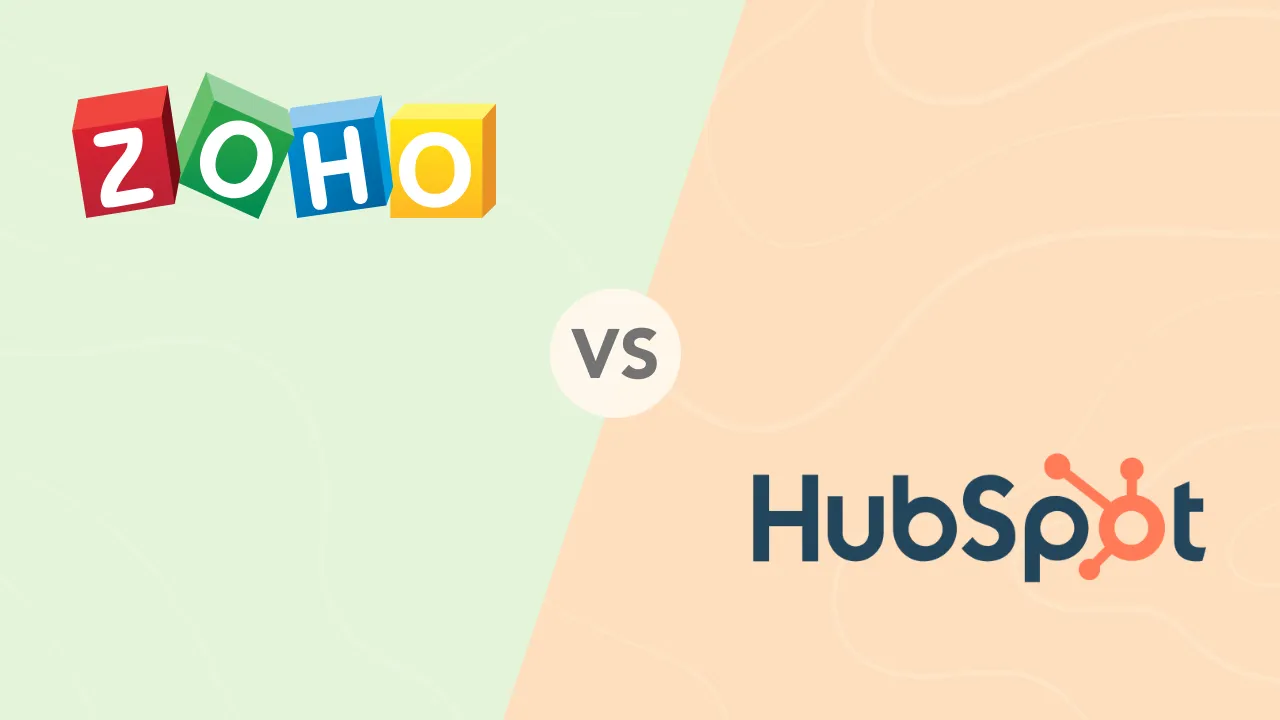Best Websites to Sell Your Stuff in 2025: Top Platforms for Maximum Profit

Best Websites to Sell Your Stuff in 2025: Top Platforms for Maximum Profit
In 2025, selling things online has become easier and more accessible than ever, thanks to various online selling platforms that cater to different needs. Whether you’re decluttering your home or launching an eCommerce business, the right platform can make all the difference. This listicle will guide you through the best websites to sell your stuff and help you find the best platform to sell online in 2025.
Types of Online Selling Sites
Online selling sites can be broadly categorized into three types: online marketplaces, niche platforms, and local selling sites. Online marketplaces, such as Amazon and eBay, are large platforms that allow sellers to list their products and reach a vast audience. Niche platforms, such as Etsy and Ruby Lane, specialize in specific product categories and cater to a targeted audience. Local selling sites, such as Craigslist and Facebook Marketplace, allow sellers to sell products locally and connect with buyers in their community.
1. eBay – The Classic Online Marketplace
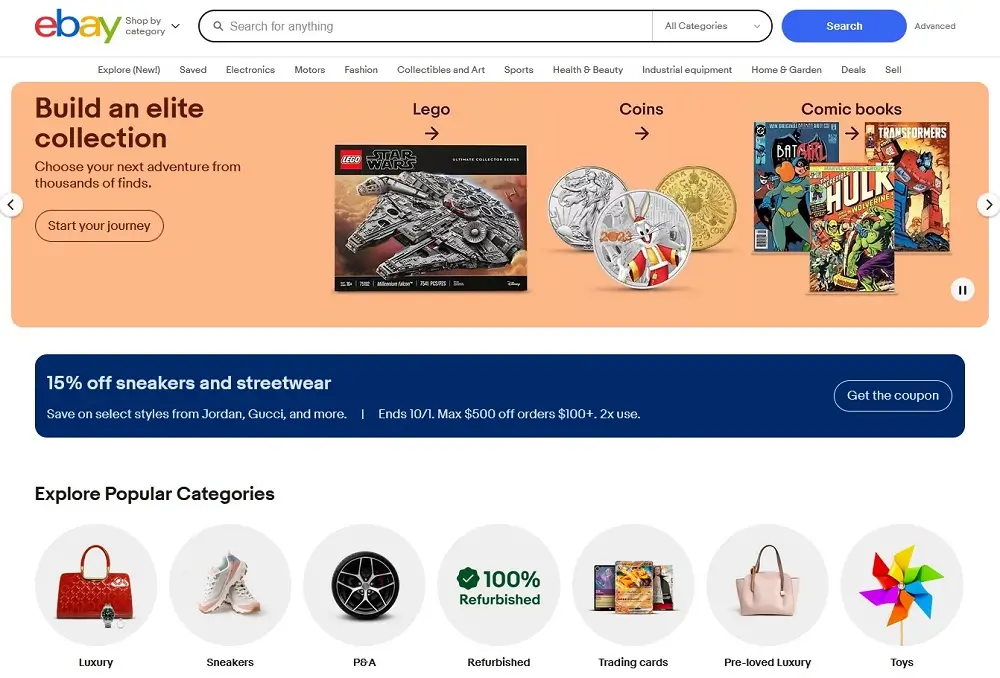
If you’re wondering, “What site can I sell stuff on?”, eBay should be one of the first names that come to mind. Known for its global reach and diverse audience, eBay allows you to sell items online, ranging from used electronics and collectibles to brand-new products. Whether you opt for auction-style listings or fixed-price sales, eBay offers flexibility.
Why eBay?
- Global audience: Sell to millions of users worldwide.
- Diverse categories: Suitable for everything from vintage items to electronics.
- Best for: Selling unique, rare, or high-demand items, collectibles, and used goods.
Pros:
- Global reach: Access millions of potential buyers around the world.
- Diverse categories: Sell anything from electronics to vintage items.
- Flexible selling options: Choose between auctions or fixed-price sales.
Cons:
- Fees can add up: eBay charges listing fees, final value fees, and PayPal fees, which can reduce your profit margin.
- Highly competitive: With millions of sellers, standing out can be challenging.
2. Amazon – The Ideal Place to Sell Products Online
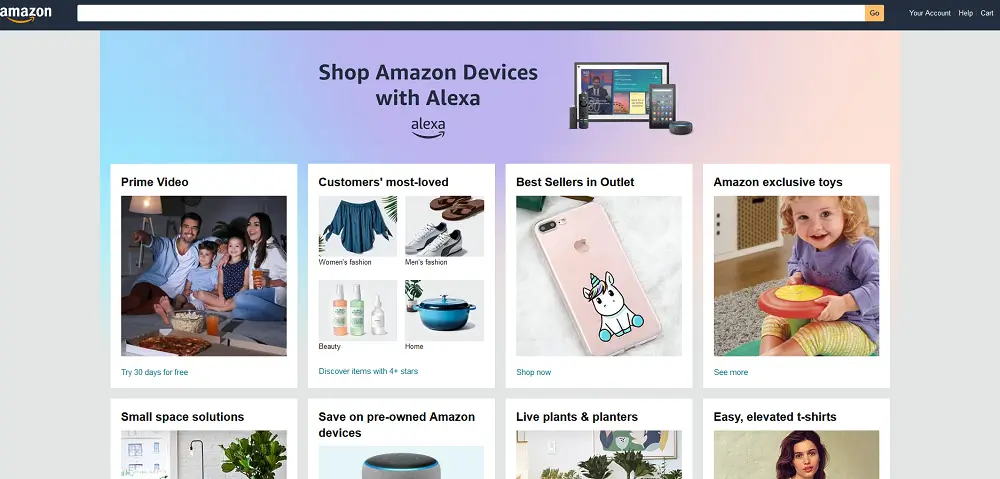
For those looking to reach a massive audience with a best-selling platform, Amazon is the go-to. As the world’s largest online marketplace, it’s ideal for professional sellers and businesses. With Amazon’s FBA (Fulfillment by Amazon), you can let Amazon handle the shipping, returns, and customer service while focusing on sales.
Why Amazon?
- Massive audience: Sell to millions of buyers across the globe.
- Fulfillment services: Simplified logistics with Amazon FBA.
- Best for: New products, electronics, books, and household items.
Pros:
- Huge customer base: Access to millions of active buyers worldwide.
- FBA option: Amazon handles logistics, making it easier for you.
- Trust and credibility: Buyers trust Amazon for fast shipping and reliable service.
Cons:
- High fees: Amazon’s selling fees and FBA costs can be significant, especially for small margins.
- Strict policies: Sellers must adhere to Amazon’s stringent rules, which can lead to account suspension for violations.
- Transaction fees: Sellers without an active membership subscription may face higher fees per transaction.
3. Facebook Marketplace – Ideal for Local Selling
Facebook Marketplace has emerged as one of the best places to sell used items in your local area. It allows users to post items for sale directly within their community, offering a quick, easy, and free way to sell second-hand items without the need for shipping.
Why Facebook Marketplace?
- Free to use: No listing or transaction fees.
- Local reach: Ideal for selling to people in your immediate area. It is an excellent platform to sell stuff locally, connecting sellers with buyers in their immediate area.
- Best for: Used furniture, clothing, household items, and local pickups.
Pros:
- Free to use: No listing or transaction fees.
- Local focus: Sell to people in your immediate area, no shipping required.
- Quick listings: Easy to post an item and connect with potential buyers.
Cons:
- Limited security: No buyer or seller protection makes larger transactions riskier.
- Local-only: Not ideal for sellers who want to reach a broader audience.
4. Etsy – Ideal Platform for Handmade and Vintage Goods
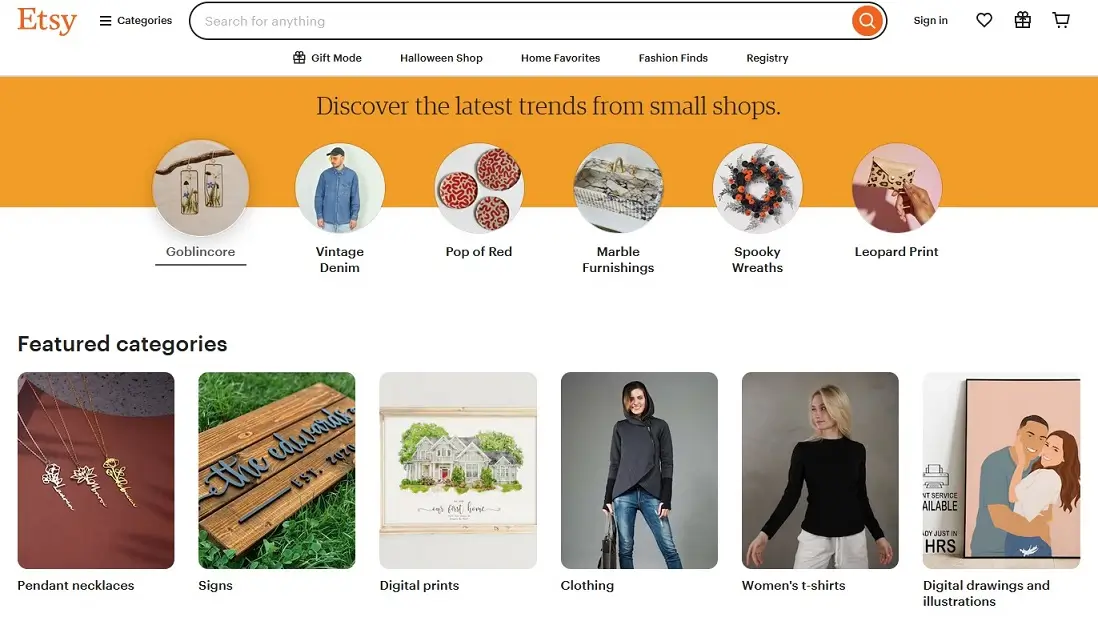
If you’re an artist, crafter, or vintage enthusiast, Etsy is the best website to sell handmade, unique, or vintage products. This marketplace is known for its niche audience that appreciates creativity and one-of-a-kind items. Whether it’s jewelry, home decor, or art, Etsy has a dedicated customer base.
Why Etsy?
- Targeted audience: Focus on buyers seeking handmade and vintage products.
- Creative-friendly: Perfect for artists, designers, and crafters.
- Best for: Handmade goods, vintage items, and craft supplies.
Pros:
- Niche audience: Perfect for handmade, vintage, or artistic goods.
- Creative control: Showcase your brand and creativity with customizable storefronts.
- Community-driven: Strong support from a community of makers and buyers who appreciate craftsmanship.
Cons:
- Listing fees: Etsy charges listing fees plus transaction fees, which can add up over time.
- Limited categories: Not ideal for sellers outside of the handmade or vintage niche.
5. Poshmark – Ideal for Selling Fashion
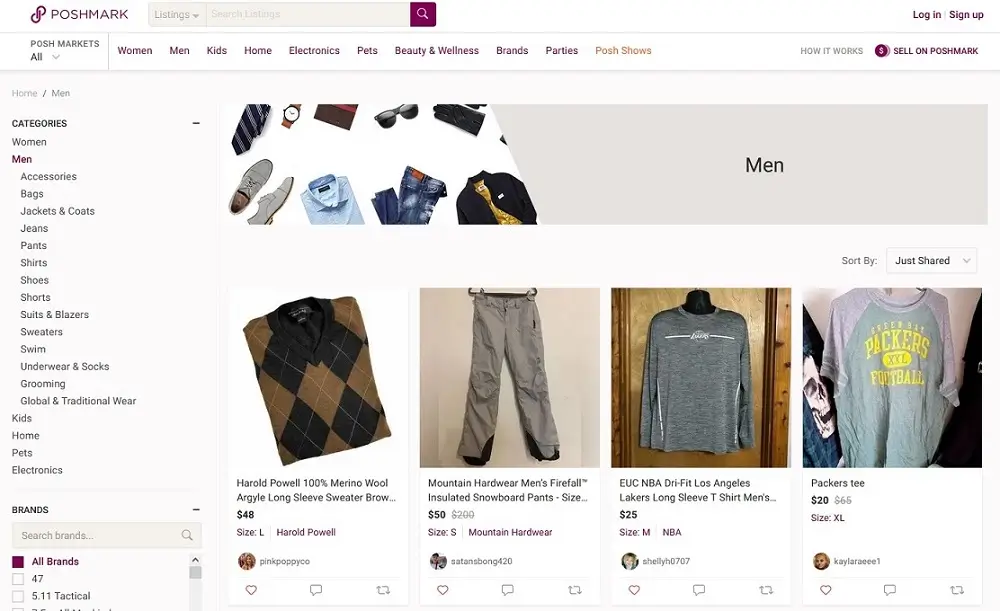
If you’re looking to sell items online in the fashion category, Poshmark is the best choice. Poshmark’s platform is built around community and social selling, which is perfect for those wanting to sell stuff online while engaging with buyers. You can list items like clothes, shoes, and accessories quickly and easily.
Why Poshmark?
- Fashion-focused: Great for selling new or gently used clothing and accessories.
- Community-driven: Social selling features let you interact directly with buyers.
- Best for: Fashion, apparel, shoes, and accessories.
Pros:
- Fashion-focused: Ideal for selling apparel and accessories.
- Social interaction: Sellers can engage buyers through shares, comments, and likes.
- Easy shipping: Poshmark provides a prepaid shipping label, simplifying logistics.
Cons:
- High fees: Poshmark takes a 20% commission on sales over $15.
- Limited to fashion: Not suitable for sellers outside the clothing or accessories niche.
6. Craigslist – Ideal for Local Classifieds
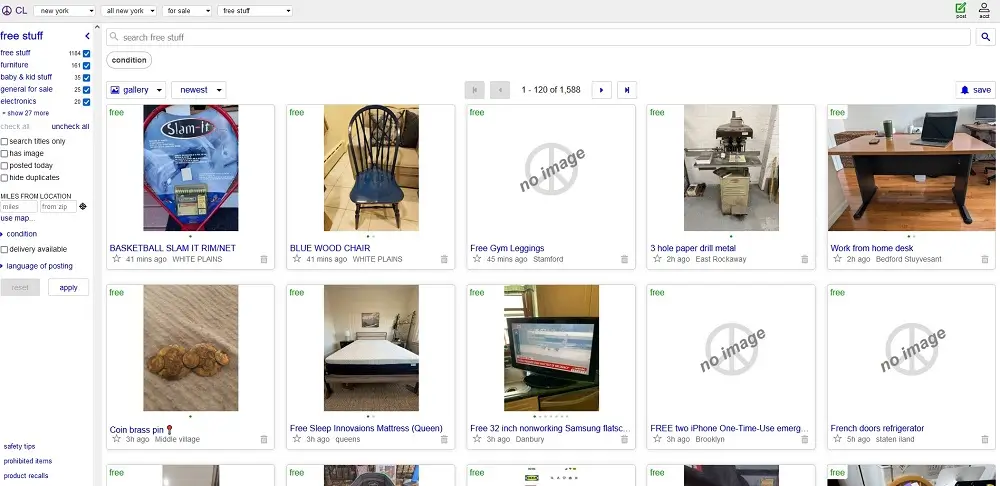
Craigslist remains a strong contender in the sites to sell stuff category for local sales. This platform is free to use and lets you list virtually anything—from cars to furniture to electronics. Craigslist is best for larger items you don’t want to ship and prefer local buyers to pick up.
Why Craigslist?
- No fees: Free to list and sell.
- Local buyers: Ideal for selling larger items locally.
- Best for: Used furniture, vehicles, electronics, and household goods.
Pros:
- Free to list: No fees for most categories.
- Local focus: Avoid shipping costs by selling to nearby buyers.
- Wide variety: Sell virtually anything, from cars to household goods.
Cons:
- No seller protection: Risk of scams or fraud, as transactions are typically face-to-face.
- Limited features: No built-in payment or shipping options, making transactions less secure.
7. Mercari – Ideal for Selling Almost Anything
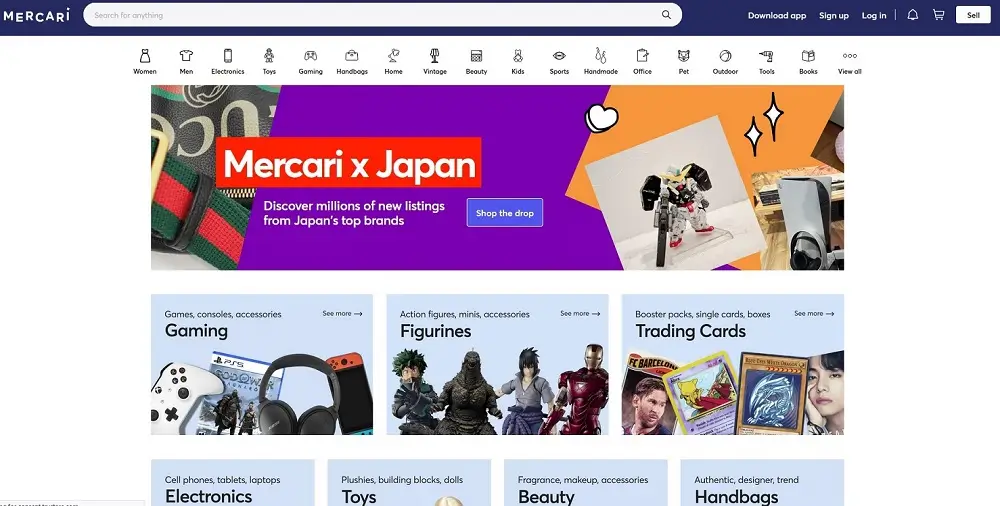
Mercari is a versatile marketplace that allows you to sell items online across various categories, from fashion to electronics. It’s a straightforward platform where you can snap a picture, list your item, and ship it once it sells. Mercari is perfect for casual sellers looking to declutter and make extra cash.
Why Mercari?
- Simple interface: Easy to list and manage sales.
- Wide variety: Sell everything from clothes to electronics.
- Straightforward for selling items online: Ideal for those looking to start selling items online with ease.
- Best for: Casual sellers, clothing, electronics, and household items.
Pros:
- Wide variety: Sell anything from clothes to electronics.
- Easy to use: Simple listing process with shipping labels provided.
- Low fees: Mercari charges a 10% commission, which is lower than some competitors.
Cons:
- Limited reach: Smaller audience compared to larger platforms like eBay or Amazon.
- Slow customer support: Some users report issues with slow response times.
Related Articles
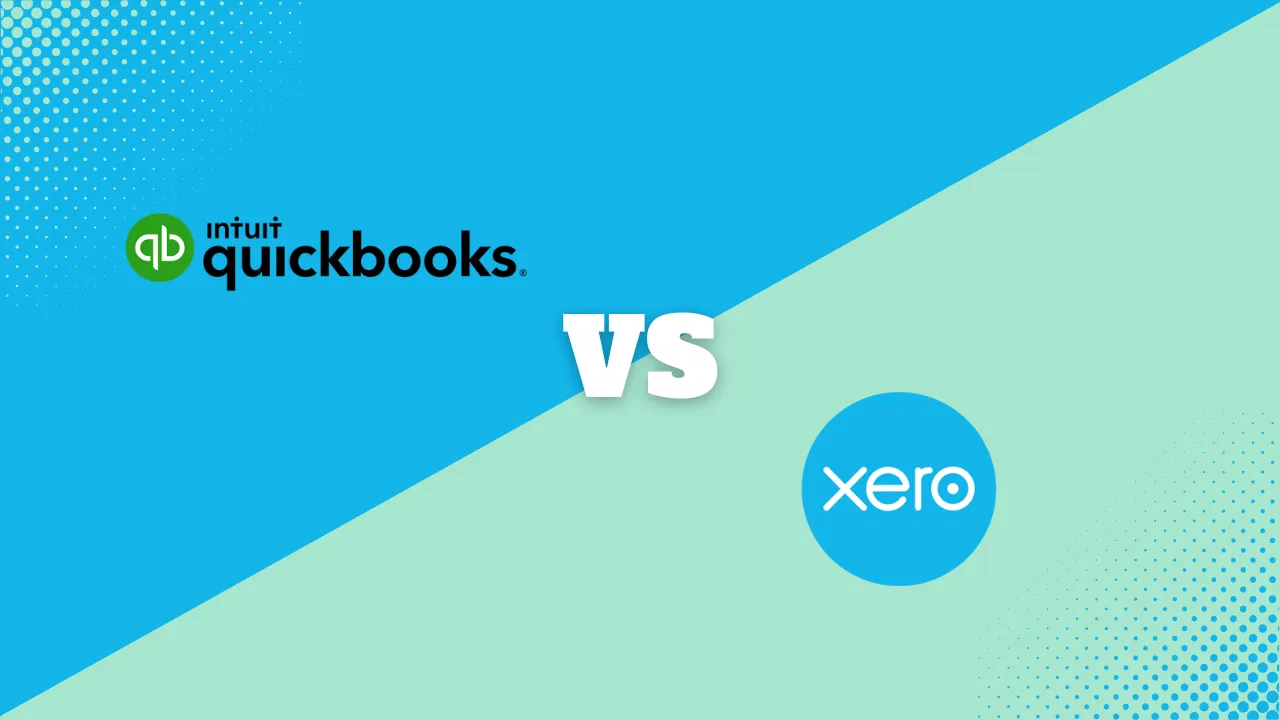


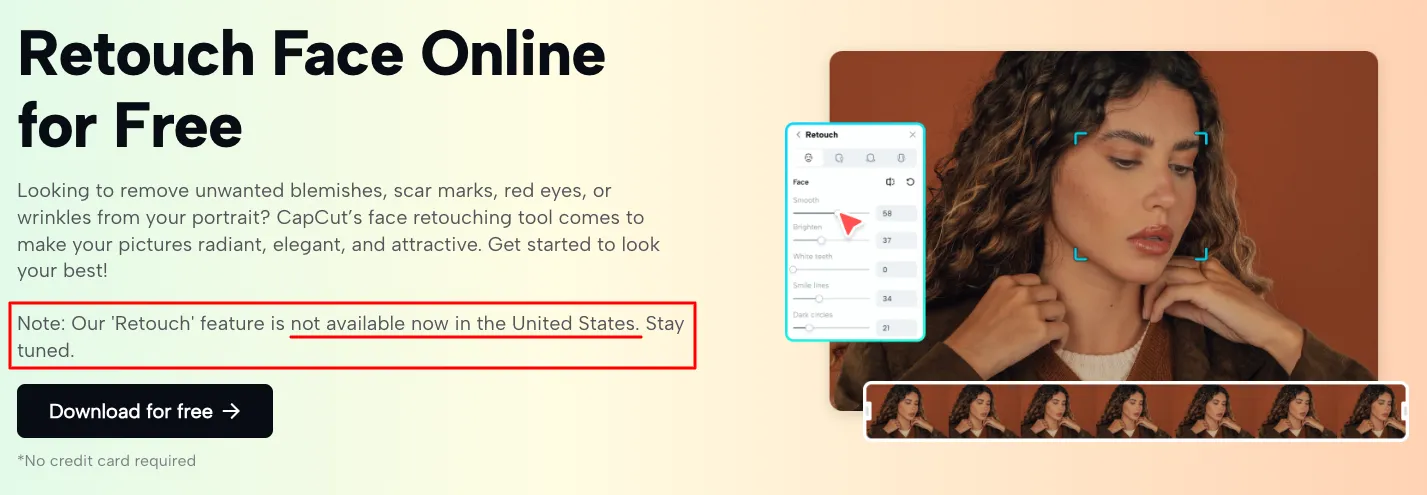
8. Depop – Ideal for Gen Z Sellers
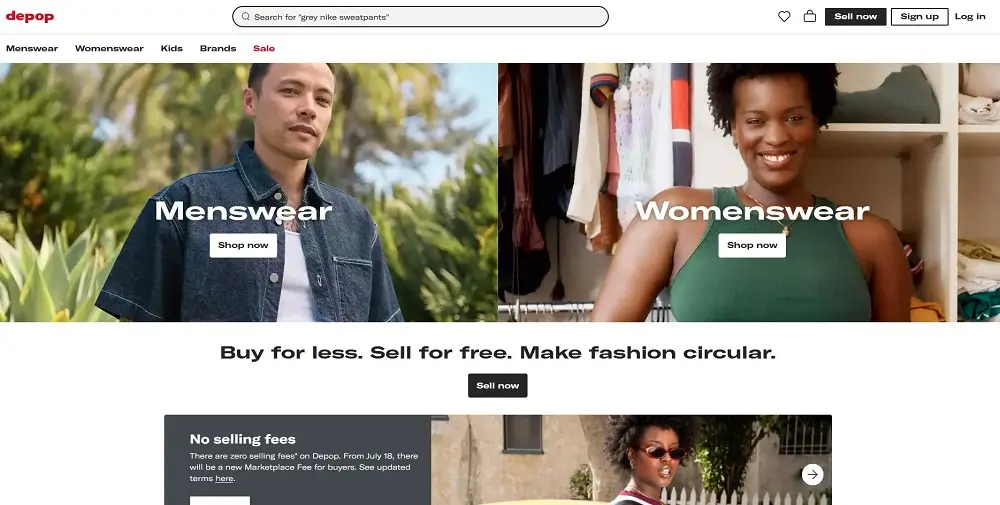
Depop is the best online selling platform for younger audiences, particularly Gen Z. It blends fashion with social media elements, creating an engaging marketplace for selling second-hand and vintage clothing. Sellers often use Depop to showcase creative outfits or vintage collections.
Why Depop?
- Targeted audience: Popular with younger, fashion-forward buyers.
- Social selling: Blend of marketplace and social media.
- Best for: Vintage fashion, streetwear, and unique clothing.
Pros:
- Youth-focused: Popular with younger, fashion-forward audiences.
- Social integration: Combines marketplace features with social media elements.
- Creative freedom: Showcase your personal style and creativity through unique listings.
Cons:
- Limited categories: Focuses mainly on fashion, so not suitable for other categories.
- High competition: With a large number of sellers, it can be hard to stand out.
9. OfferUp – Ideal for Mobile Selling
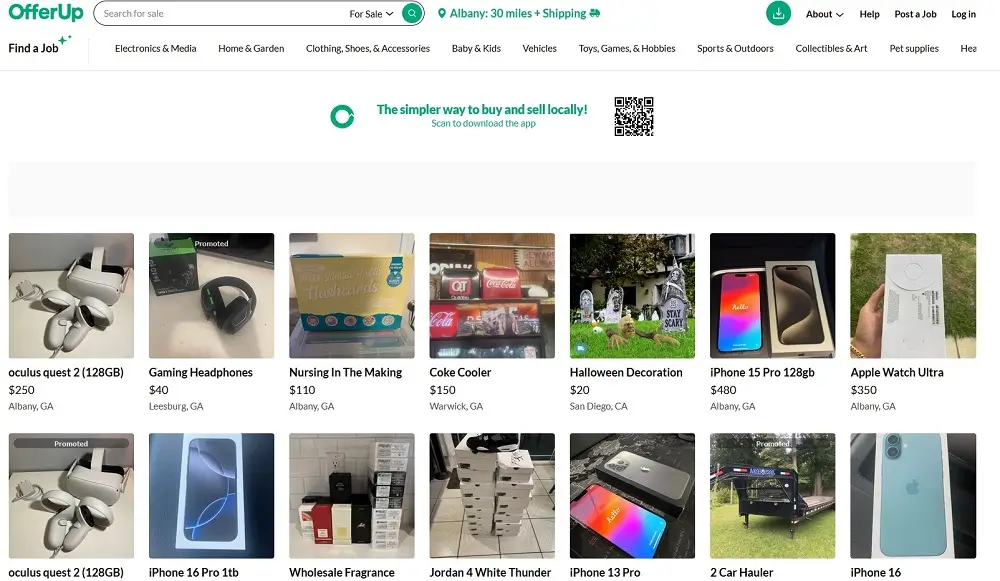
OfferUp is a mobile-focused platform similar to Craigslist but more user-friendly. It’s a great app for selling items locally, but it also offers a shipping option for national sales. With a focus on mobile listings, it’s easy to snap a photo, post your item, and start selling.
Why OfferUp?
- Mobile-first: Perfect for sellers who prefer using their smartphones.
- Local or national reach: Choose to sell locally or ship nationwide.
- Best for: Used electronics, furniture, household items, and local sales.
Pros:
- Mobile-friendly: List and manage items directly from your smartphone.
- Local or national reach: Choose to sell locally or ship items across the country.
- Simple interface: Easy to use with a fast listing process.
Cons:
- Limited support: Customer service can be slow in resolving disputes.
- Local sales risks: As with other local selling platforms, there’s a risk of scams or no-shows.
10. Bonanza – Ideal for Selling a Wide Range of Products
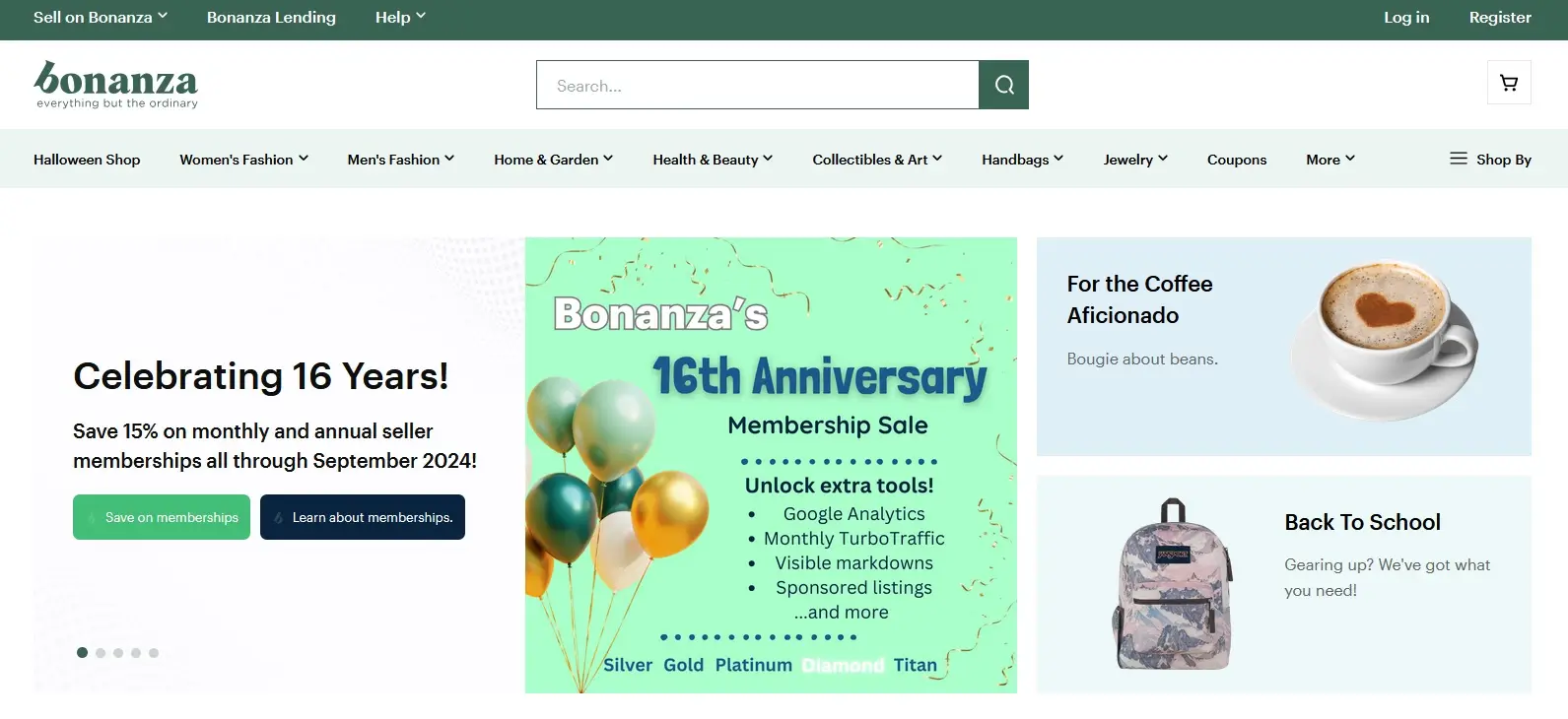
Bonanza is a growing online selling platform that allows sellers to list various products, from fashion to home goods, electronics, and even art. Known for its user-friendly interface, low fees, and seamless integration with other marketplaces like eBay and Amazon, Bonanza is a flexible option for sellers who want to reach multiple audiences without high costs.
Why Bonanza?
- Low fees: Sellers enjoy lower fees compared to larger platforms.
- Wide variety: Perfect for selling a broad range of products, from handmade items to electronics.
- Best for: Sellers looking for a versatile platform with minimal overhead.
Pros:
- Low Fees: Bonanza charges lower fees compared to major marketplaces like Amazon or eBay, making it more affordable for sellers.
- Easy Integration: You can easily sync listings with other platforms like eBay, Amazon, and Etsy to expand your reach.
- User-Friendly Interface: The platform is simple, with intuitive tools for listing products.
- Diverse Product Range: Sellers can list various items, from handmade goods to electronics, making it versatile.
- Seller-Centric: Bonanza focuses on supporting sellers with great customer service and transparent policies.
Cons:
- Lower Traffic: Bonanza doesn’t have a buyer base as large as major platforms like eBay or Amazon, which may result in slower sales.
- Limited Brand Recognition: Not as well-known as other selling platforms, which could affect buyer trust and recognition.
- Advertising Costs: To gain more visibility, sellers may need to invest in Bonanza’s paid advertising, which will increase overall costs.
Local and Global Online Selling Options
When it comes to selling products online, sellers have the option to sell locally or globally. Local selling sites, such as Craigslist and Facebook Marketplace, are ideal for sellers who want to sell products to buyers in their local community. Global online selling sites, such as Amazon and eBay, allow sellers to reach a global audience and sell products to buyers from all over the world.
Niche Online Selling Platforms
Niche online selling platforms specialize in specific product categories and cater to a targeted audience. For example, Etsy is a niche platform for artisans and crafters selling handmade items, vintage goods, or craft supplies. Ruby Lane is a niche platform for sellers of antiques, collectibles, and vintage items. These platforms provide a unique opportunity for sellers to connect with buyers who are specifically looking for their type of products.
Building Your Own Online Store: The Best Platforms for Entrepreneurs
Building your online store is the way to go if you’re serious about selling products online and want full control over your brand. Running your own store allows you to maximize profits and establish a unique brand identity, free from the fees and restrictions of third-party marketplaces. While selling on marketplaces like eBay or Amazon can give you quick access to a large audience, creating your store offers flexibility, scalability, and the ability to build a unique brand identity. Platforms like Wix eCommerce, Shopify, and BigCommerce are among the best options for launching your store. Here’s how these platforms compare and why they might fit your business perfectly.
Wix eCommerce – Ideal for Beginners and Small Businesses
Wix eCommerce is a user-friendly website builder that offers a robust platform for creating your own online store. If you’re a small business or just starting out, Wix is ideal due to its intuitive drag-and-drop editor, which makes setting up an online shop easy and quick. Wix offers a variety of professional design templates, customizable features, and built-in tools to help you manage inventory, process payments, and market your store.
 Dropshipping-friendly
Dropshipping-friendly  Social Media & Amazon selling integration
Social Media & Amazon selling integration Pros:
- Easy to use: Drag-and-drop website builder is perfect for beginners with no coding experience.
- Affordable: Lower pricing plans, making it accessible for small businesses and entrepreneurs.
- Professional templates: Beautifully designed templates that can be easily customized to fit your brand.
Cons:
- Limited scalability: Wix eCommerce is great for small to medium businesses but may not offer the same scalability and advanced features as other platforms for large-scale operations.
- Fewer integrations: While Wix has many built-in tools, it doesn’t have as many third-party integrations compared to other platforms like Shopify or BigCommerce.
Good for:
Small businesses, creative entrepreneurs, and those just starting out with eCommerce.
Wix eCommerce allows you to build a professional online store with ease, making it ideal for individuals or businesses that want an affordable, customizable platform without the complexities of more advanced eCommerce solutions.
Shopify – Ideal for Growing Businesses and Customization
Shopify is one of the most popular and powerful online selling platforms, known for its ability to help businesses scale from startups to established brands. It provides everything you need to build, manage, and grow your online store. With a vast range of themes, apps, and integrations, Shopify offers extensive customization options, allowing you to tailor your store to your brand’s needs. Additionally, Shopify is highly scalable, making it suitable for businesses of all sizes.
 Trusted by millions of businesses globally
Trusted by millions of businesses globally  Drag-and-drop store creator
Drag-and-drop store creator Pros:
- Highly customizable: Shopify offers thousands of apps and integrations, allowing you to extend your store’s functionality.
- Built-in tools: Includes powerful tools for SEO, inventory management, and marketing.
- Scalable: Perfect for businesses of all sizes, from small entrepreneurs to large enterprises.
- Shopify Payments: Built-in payment gateway that simplifies transactions and reduces processing fees.
Cons:
- Monthly fees: Shopify’s plans start at $29/month, with additional transaction fees for using third-party payment gateways.
- Learning curve: While the platform is user-friendly, mastering Shopify’s full potential may require some time and technical knowledge.
Good for:
Businesses looking to scale, entrepreneurs with growth in mind, and sellers needing extensive customization options.
Shopify is a top choice for serious sellers who want a customizable and scalable platform. Whether you’re a small shop looking to expand or an established brand seeking better eCommerce functionality, Shopify offers the flexibility to grow with your business.
BigCommerce – Ideal for Large Businesses and Enterprises
BigCommerce is a powerful eCommerce platform designed for businesses that need more advanced features and scalability. With a focus on performance and customizability, BigCommerce is particularly suited for large businesses or those with extensive product catalogs. The platform provides robust SEO tools, integrated payment solutions, and multi-channel selling capabilities. BigCommerce also offers customizable storefronts without needing as many apps as other platforms, which can lower your overall costs. Additionally, BigCommerce integrates seamlessly with various online stores, helping sellers manage multiple sales channels effectively.
 240+ design templates
240+ design templates  Drag & drop product merchandising
Drag & drop product merchandising Pros:
- Scalable and flexible: BigCommerce offers features ideal for large-scale operations, such as unlimited products, bandwidth, and file storage.
- SEO-friendly: Built-in SEO features help drive traffic to your store and improve search rankings.
- Multi-channel selling: Sell across platforms like Amazon, eBay, and social media directly from your BigCommerce dashboard.
- No transaction fees: Unlike Shopify, BigCommerce does not charge transaction fees, which can save you money as your sales grow.
Cons:
- More complex: BigCommerce can be overwhelming for small businesses or beginners due to its more advanced features.
- Higher price point: While competitive for large businesses, BigCommerce may be more expensive for smaller startups compared to other platforms.
Good for:
Large businesses, enterprises, and companies with high-volume sales or large product catalogs.
BigCommerce is a robust solution for businesses that need an eCommerce platform capable of handling high traffic, large inventories, and complex product offerings. It’s ideal for established businesses looking to scale further or enterprises that require advanced functionality and performance.
Which Platform Is Right for You?
Choosing the right platform depends on your business size, goals, and level of expertise. Here’s a quick comparison to help you decide:
- Wix eCommerce: Ideal for small businesses or beginners looking for an easy, affordable solution to build a professional store quickly.
- Shopify: Perfect for businesses of all sizes that want a customizable, scalable platform with a wide range of integrations and apps.
- BigCommerce: Ideal for large businesses or enterprises that need advanced features, scalability, and multi-channel selling options.
Build Your Dream Online Store
Building your own online store provides you with full control over your brand, customer experience, and growth potential. Whether you’re just starting or looking to scale an established business, platforms like Wix eCommerce, Shopify, and BigCommerce offer the flexibility and tools you need to succeed in the competitive eCommerce landscape. Each platform has its strengths, so consider your business needs, budget, and long-term goals when choosing the right platform for you.
Conclusion
Choosing the best platform to sell online depends on what you’re selling, how much control you want over your store, and how involved you want to be in the selling process. Whether you’re decluttering your home, selling fashion, or launching a full-scale business, there’s a platform tailored to your needs. From Amazon for professional sellers to Facebook Marketplace for local sales, each platform offers unique features to help you succeed in 2025.
For those looking to build a more established presence, building your online store provides you with full control over your brand, customer experience, and long-term growth potential. Whether you’re just starting or aiming to scale an established business, platforms like Wix eCommerce, Shopify, and BigCommerce offer the flexibility and tools you need to thrive in a competitive eCommerce landscape. Each platform has strengths: Wix is perfect for beginners, Shopify is highly customizable and scalable, and BigCommerce is ideal for large enterprises.
When choosing the right platform, consider your business needs, budget, and goals, as well as whether you want to utilize an established marketplace or create your own unique online storefront.




